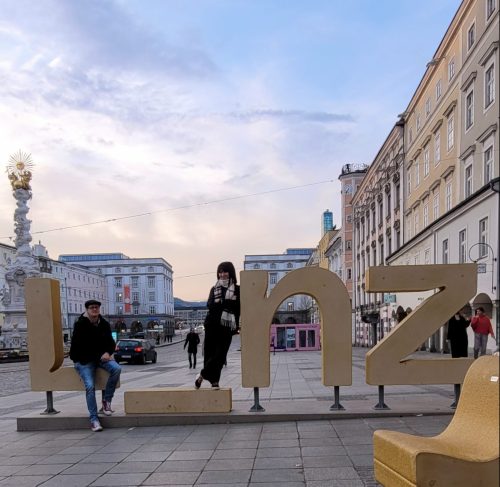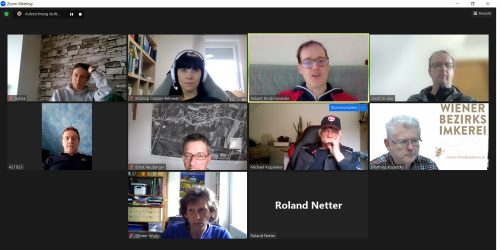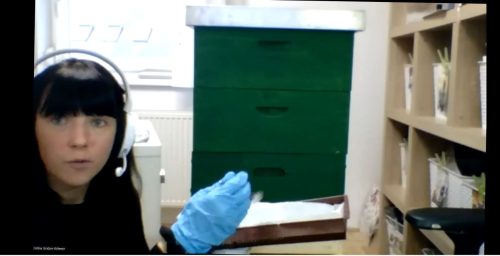The INSIGNIA-EU poster presented at the European Citizen Science Conference in Vienna, Austria (also for download)
The poster for download: GratzerBrodschneiderINSIGNIAEU_PosterECSK2024
Kristina Gratzer

PREPARATORY ACTION FOR MONITORING OF ENVIRONMENTAL POLLUTION USING HONEY BEES
The INSIGNIA-EU poster presented at the European Citizen Science Conference in Vienna, Austria (also for download)
The poster for download: GratzerBrodschneiderINSIGNIAEU_PosterECSK2024
Kristina Gratzer
“Let’s celebrate Citizen Science together at the 5th conference of the European Citizen Science Association (ECSA) and the 9th Austrian Citizen Science Conference.” – Yes we did!
ECSA, together with the Natural History Museum Vienna, Boku University and Österreich forscht, organised this event from April 3rd to 6th 2024 in Vienna, Austria. Among the 500 participants, Robert Brodschneider and Kristina Gratzer from the University of Graz were included.
The conference was packed with interesting presentations and workshops on a wide range of citizen science projects and relevant topics. On the first conference day, Kristina Gratzer represented the INSIGNIA-EU consortium with a poster. The special thing about the poster session was that each presenter was provided with a bottle of wine and offered a glass to anyone interested while talking about the poster. We would love to see this approach at other conferences as well. On Friday, the 5th, Robert Brodschneider held a talk about Beekeeper participation in environmental monitoring in Europe in front of ca 50 people, followed by an intense talk about beekeeper citizen scientists.
INSIGNIA-EU Poster with bee hives in the background
Continue reading “April in Vienna: European Citizen Science Conference”
This year’s Austrian Citizen Science Conference took place from April 19 to 21, 2023 at the Johannes Kepler University in Linz, Austria. The conference was initiated by the network “Österreich forscht” (BOKU Vienna) and in cooperation with Ars Electronica and the Ludwig Boltzmann Gesellschaft.
Robert Brodschneider and Kristina Gratzer from the University of Graz participated together with approximately 150 other Citizen Science enthusiasts.

Continue reading “Austrian Citizen Science Conference 2023 in Linz”
Project preparations are in full swing throughout the EU – also in Austria!
All Austrian participants got their tool boxes, so it was time to enter the next stage . Thus, on April 14th, we organized a workshop for beekeepers in Austria. The main goal was to give instructions on how to do the sampling for the INSIGNIA-EU fullstudy 2023. As a physical workshop was not possible at this time, we invited all 10 participants to attend to the online worshop, which turned out to work very well. For one person it was not possible to take part, but thanks to advances in technology, we were able to record and provide the entire workshop. 
Kristina set-up an empty demonstration beehive and went through the whole sample collection process. The citizen scientists were encouraged to interrupt and ask questions at any time.

Thank you all for the participation and the pleasant atmosphere and interest and good luck to all INSIGNIA-EU citizen scientists for the study start next week!
Kristina Gratzer und Robert Brodschneider
For the full study in 2023, the sampling will be expanded to all 27 European Union countries. To sucessfully activate the widespread beekeeping community in Europe, the INSIGNIA-EU consortium will also be expanded by subcontracting a total of 19 institutions. Thus, we are able to cover all European Union member states and all 23 European languages.
It has been a while, since the INSIGNIA-EU consortium held an online event to meet the subcontractors on July 6. Nevertheless, we want to inform our readers about this important meet and greet.
Continue reading “First meeting with all national coordinators from Europe (online event)”
In one of the recent blog entries, we talked about the different stages of participation of volunteers in a citizen science study. This time, we want to address that the form of involvement in a citizen science study can also be very different.
Let’s talk about three different categories of citizen science studies, that are described in literature and to whom the INSIGNIA-EU can be allocated (Bonney et al., 2009, see also Table 1).
Contributory projects: Typically, scientists design the study and the public is primarily involved by collecting data.
Collaborative projects: Scientists generally design the study, the public is involved by not only collecting the data, but also takes part in evaluating the study-setup, help analyzing data or is part of the dissemination process.
Co-created projects: Scientists work together with the public to design a study and at least a part of the volunteers is involved in all steps of the study process.
Continue reading “INSIGNIA-EU – the citizen scientist’s opinion counts too!”
Continue reading “Sjef’s visit in Graz and trip to two Austrian citizen scientists”
Citizen Science – why not?
This was the topic of the 7th Austrian citizen science conference held end of June in Dornbirn visited by researchers from Austria, Switzerland and Germany. Citizen science is scientific research partly being done by non-professionals, which are nonetheless experts and/or enthusiasts in a specific field.
Of course, the Austrian partners of the INSIGNIA-EU project from the University of Graz did not miss the opportunity to be a part of this event. They presented the valuable volunteer work of beekeepers acting as citizen scientists in projects like INSIGNIA or INSIGNIA-EU. Continue reading “7th Austrian Citizen Science Conference 2022 or dear national coordinators”
The first sampling round is behind us and in the course of this, we were able to familiarize ourselves with the sampling materials and the sampling process.
The pilot study in 2022 is relatively complex and involves many different methods, that the participating beekeepers have to engage with.
Because pictures are known to say more than 1000 words, we made a video of the sampling and uploaded it to YouTube. This should serve as a supplement to the picture manual and hopefully increases the understanding of the course of the pilot study.
Since the pollen trap of the hives was still closed at the time of sampling, the pollen sampling is not included in the video, but will be added later on.
The video can be watched through the following LINK.
Kristina Gratzer
This year, the C*Sci2022 conference will be held online from May 23-May 26. Registered parties will be able to join interesting discussions and have access to more than 100 posters and douzens of talks about a variety of citizen science projects around the world.
The opening keynote will be held by Dr. Mónica Ramírez-Andreotta, who will give a talk on “Cultivating Science, Justice, and Action”
Of course, the INSIGNIA-EU team will also be part of the conference by presented a poster about the project (dowload the PDF poster here –> INSIGNIAPoster)
Be sure to sign up and learn more about citizen science.
Link to the conference website: https://citizenscience.org/c-sci-2022/csci2022-program-details/
Kristina Gratzer and Robert Brodschneider